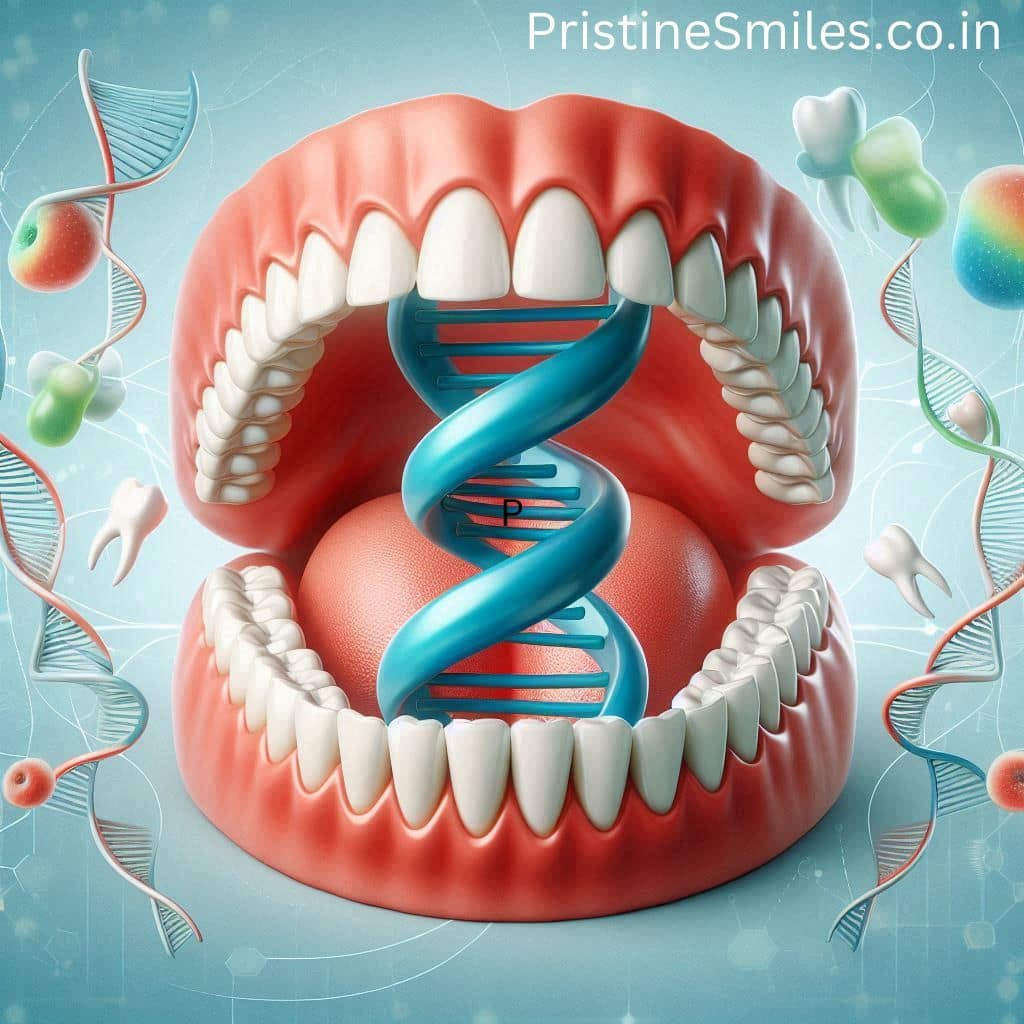The connection between genetics and oral health is a fascinating and rapidly evolving field of research. At Pristine Smiles Dental Care in Juhu, we’re committed to staying at the forefront of this knowledge, ensuring our patients receive the best possible care. In this blog, we’ll explore the exciting developments in the relationship between genetics and oral health.
Oral health is a vital aspect of our overall well-being, and genetics play a significant role in determining our susceptibility to various dental issues. Recent advances in genetic research have shed light on the intricate relationship between genetics and oral health, enabling us to better understand the underlying causes of dental problems and develop effective prevention and treatment strategies. In this blog, we’ll delve into the fascinating world of genetics and oral health, exploring the latest findings and their implications for dental care.

The Genetic Influence on Oral Health
Research has consistently shown that genetics contribute significantly to our oral health, influencing our risk of developing conditions such as tooth decay, gum disease, and oral cancer. Studies have identified multiple genetic variants associated with increased susceptibility to these issues, including:
- Tooth decay: Genetic variations in the gene responsible for tooth enamel development (ENAM) have been linked to an increased risk of tooth decay.
- Gum disease: Genetic variants in the genes involved in inflammation and immune response (e.g., IL1A and IL1B) have been associated with an increased risk of gum disease.
- Oral cancer: Genetic variations in genes involved in DNA repair and cell growth regulation (e.g., TP53 and CDKN2A) have been linked to an increased risk of oral cancer.
Understanding the genetic factors at play can help us tailor treatment plans to individual needs, leading to more effective prevention and treatment strategies.
Genetic Testing in Dentistry
Genetic testing is becoming increasingly important in dentistry, enabling us to:
- Identify genetic markers for oral health issues
- Develop personalized treatment plans
- Optimize preventive care
- Improve patient outcomes
For instance, genetic testing can help identify individuals at high risk of tooth decay or gum disease, allowing for targeted preventive dental care measures such as more frequent cleanings and fluoride treatments.
Empirical Evidence
Numerous studies have demonstrated the significance of genetics in oral health:
- A study published in the Journal of Dental Research found that genetic variants in the ENAM gene were associated with an increased risk of tooth decay.
- A study published in the Journal of Periodontology found that genetic variants in the IL1A and IL1B genes were associated with an increased risk of gum disease.
- A study published in the Journal of Oral Pathology and Medicine found that genetic variants in the TP53 and CDKN2A genes were associated with an increased risk of oral cancer.
Meet the Team
Our team of experts is dedicated to providing exceptional care, combining cutting-edge technology with a compassionate, patient-centered approach. Meet our team:
- Dr. Nehal Sanghani – Founder and Periodontist
- Dr. Siddharth Shah – Orthodontist
- Dr. Akshay Punjabi – Endodontist
- Dr. Gaurav Salgia – Oral and Maxillofacial Surgeon
- Dr. Harsh Shah – Pedodontist
- Dr. Vasant Bhanushali – Oral and Maxillofacial Surgeon
- Dr. Prajwal Shetty – Endodontist
Conclusion
The connection between genetics and oral health is a complex and fascinating area of research, holding great promise for improving dental care. By understanding the genetic factors that contribute to oral health issues, we can develop personalized treatment plans and optimize preventive care. As genetic testing becomes more widespread in dentistry, we can expect even more effective and targeted treatments for our patients. Embracing the latest advances in genetic research, we can work together to achieve optimal oral health for all. At Pristine Smiles Dental Care, we’re committed to harnessing this knowledge to provide exceptional, personalized care. Experience the future of dentistry today – book your appointment now!
FAQs
- How does genetics influence our susceptibility to oral health issues?
Genetics can influence our risk of developing conditions such as tooth decay, gum disease, and oral cancer through variations in genes related to enamel development, inflammation, immune response, DNA repair, and cell growth regulation. - Can genetic testing help prevent oral health issues?
Yes, genetic testing can identify individuals at high risk of tooth decay, gum disease, and oral cancer, allowing for targeted preventive measures and personalized treatment plans. - What are some examples of genetic variants associated with oral health issues?
Examples include variations in the ENAM gene linked to tooth decay, variants in IL1A and IL1B genes associated with gum disease, and variations in TP53 and CDKN2A genes linked to oral cancer. - How can genetic testing improve patient outcomes in dentistry?
Genetic testing can help dentists develop personalized treatment plans, optimize preventive care, and improve patient outcomes by identifying genetic markers for oral health issues. - Is genetic testing common in dental practices?
Genetic testing is becoming increasingly important in dentistry, although it may not yet be widespread in all practices. - What preventive measures can be taken for individuals at high genetic risk of oral health issues?
Preventive measures may include more frequent cleanings, fluoride treatments, and targeted lifestyle changes to reduce risk factors. - Are there any ethical concerns regarding genetic testing in dentistry?
Ethical concerns may include patient privacy, informed consent, and potential psychological implications of genetic test results. - How can individuals access genetic testing for oral health issues?
Genetic testing for oral health issues is typically done through dental professionals who specialize in genetic testing and personalized treatment planning. - What role does genetic counseling play in genetic testing for oral health?
Genetic counseling can help individuals understand the implications of genetic test results, make informed decisions about their oral health, and address any psychological concerns. - Is genetic testing covered by dental insurance?
Coverage for genetic testing may vary depending on the insurance provider and the specific test being performed. It’s best to check with your insurance provider for details.
